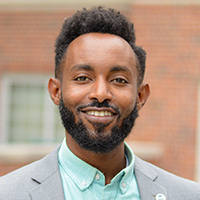
Project Title: Applying Construal Level Theory to Develop and Test an Interactive Text Messaging Adjunct Intervention to Reduce Heavy Drinking and HIV Risk
Position: Postdoctoral Scholar
Institution: Brown University
Funding NIH Institute/Center: National Institute on Alcohol Abuse and Alcoholism
Project ID: K99AA031443
Nioud Gebru, PhD, was born and raised in Addis Ababa, Ethiopia. His passion for disentangling psychosocial factors related to substance use and HIV stems from his childhood experiences and as an immigrant in the United States — experiences through which he recognized the importance of social and environmental context in determining human health and the phenomenology of substance misuse and risky behaviors as universal problems. These realizations compelled him to understand common factors that underlie these public health problems and to devise interventions to address them. Dr. Gebru completed his bachelor’s degree in psychology and his master’s in clinical psychology at the University of Maryland, College Park. He then earned his PhD in health behavior from the University of Florida (UF), where he focused on experimental, quantitative, and qualitative methods to identify psychosocial correlates of substance misuse and HIV risk. Dr. Gebru conducted postdoctoral research at Brown University Center for Alcohol and Addiction Studies. As a MOSAIC scholar, he will develop and conduct initial testing of a novel text-messaging intervention to reduce heavy drinking among young adult men at risk for HIV. Having lacked support and connections while navigating academia as an immigrant and first-generation student, Dr. Gebru works to increase support and connections for other students across the educational pathway, including through mentoring high school students, undergraduates (e.g., for the McNair Scholar program at UF during all five years of his doctoral training) and graduate students (e.g., incoming doctoral students at UF). His various roles as an active member in several diversity committees are among his efforts to enhance diversity in biomedical sciences. For example, he’s chair of the diversity committee for the Collaborative Perspective on Addictions conference, where he helps ensure that the conference’s programming values diversity and advocates for travel funds for students from underrepresented backgrounds — efforts he seeks to maintain and expand throughout his career.